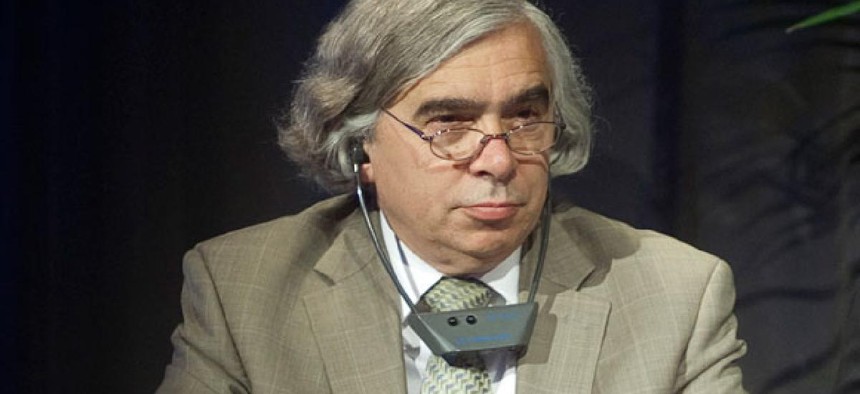
MIT's Ernest Moniz is Obama's pick to head the Energy Department. Flickr user jeanbaptisteparis
Why Obama's Energy and EPA Nominees Could Get Held Up, Too
Both may face tough questions in the Senate.
President Obama's nomination at the White House Monday of Gina McCarthy as administrator of the Environmental Protection Agency and Ernest Moniz to head the Energy Department may signal that, inaugural rhetoric aside, Obama's focus on domestic energy production and the climate has not shifted very far from his first term. Even before the 2012 election, the president argued for an "all of the above" approach to energy development, which was manifested in the work of the people McCarthy and Moniz will replace: Lisa Jackson and Steven Chu, respectively. Jackson and Chu were two of the first-term Cabinet's more hawkish proponents of climate change action, but who ultimately strongly hewed to the president's priorities. Even still, their replacements are inextricably linked now, and their confirmations will be far from headache-free.
McCarthy will be the more contentious appointee. She at one time served as the administrator of the Massachusetts Department of Environmental Protection under Mitt Romney, helping him develop the state's plan to combat climate change — but that was a different Romney than the one that campaigned last year. Now serving as the Assistant Administrator for the Office of Air and Radiation, McCarthy's strong focus on air quality rules has been hailed by environmentalists as regularly as it has been challenged by industry. As Politico notes, when McCarthy was nominated for her current position, Sen. John Barrasso of Wyoming held up her nomination for two months out of concern that she would advocate for the regulation of greenhouse gas emissions. More recently, Sen. Lisa Murkowski of Alaska expressed concern at the prolonged difficulty Shell had in getting permits to exceed air pollution limits when it began drilling operations in the Arctic. Environmental groups, on the other hand, began praising her nomination before it was announced — in part because McCarthy is seen as being as strong on environmental issues as was Lisa Jackson. At least, the sentiment seems to be, the president hasn't moved backward.
Moniz is similarly walking the trail blazed by his predecessor. Chu oversaw a DoE dedicated to expanded investment in green technology, but which may ultimately be known for presiding over the largest expansion of domestic oil production in decades. This is largely due to innovations in the extraction technique known as hydraulic fracturing, or fracking, which has created boomtowns in regions with large shale deposits containing oil and natural gas. In the past, Moniz has hailed the use of natural gas as a method of reducing the carbon dioxide emissions that promote climate warming — but for many on the left, any embrace of fracking is heresy. Moniz is also more closely tied to the energy industry than was Chu, leading an initiative at MIT that received millions in contributions from a variety of oil companies. Moniz, who in the mid-1990s served as an undersecretary in the department under President Clinton, is also an advocate of the expanded use of nuclear energy, which brings with it its own set of controversy.
Read more on The Atlantic Wire.
(Image via Flickr user jeanbaptisteparis)






